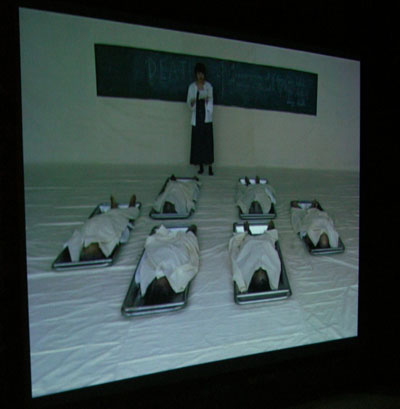 The Class, 2005 Araya Rasdjarmrearnsook The Class "If loss could be openly revealed and accepted like any other human delight, then there would not be so many suppressed feelings" (Araya Rasjarmearnsook) Araya Rasjarmearnsook is one of Thailand's most highly acclaimed contemporary artists and writers. Her early sculpture challenged the role and representation of women in Thai society, but since 1998, her installations and films have considered the transition between life and death. "The Class" is a manifestation of Rasjarmearnsook's preoccupation with death and her attempts to come to terms with the sense of loss and sorrow that it brings. Challenging the acceptable limits and ethics of presenting death, "The Class", sees Rasjarmearnsook leading a seminar on the subject to a group of shrouded corpses. Communicating and interacting with the dead, Rasjarmearnsook questions what death is like, what happens after, and wonders how the dead feel at having undergone such an experience. During the quiet moments in her presentation, the bodies make comments on the seminar that only Rasjarmearnsook can hear. She writes notes with chalk on a blackboard, recording how her class of corpses respond to questions. While the film is tinged with tragedy and sorrow, it is also captivating in its simplicity and its audacity. Talking to real corpses is shocking on a physical, immediate level, but poignant; it becomes clear through her words that she is trying to understand the spiritual realities of death and the afterlife. Although death is everywhere in "The Class", viewers are drawn not to the morbid and the melancholic, but to the provocative and thought provoking nature of Rasjarmearnsook's subject. Sitting watching the film the viewer is placed alongside the members of Rasjarmearnsook's deceased audience. Positioning her living audience amongst the dead, she forces viewers to consider how they live and reconsider their own relationship with death. Here death is living because of her refusal to hide from it. At a time when fear of violent death permeates global culture, Araya Rasjarmearnsook's film reconsiders the act of living and dying. Moving between the borderlines of life and death, she seems to suggest that spiritual death can occur in the living, while physical death need not mark the end of life. This is Araya Rasjarmearnsook's first solo exhibition in the UK. She teaches at Chiang Mai University, Thailand and has exhibited widely. Solo exhibitions include: "Lament", Tensta Konsthall, Stockholm (2003); "Why Is It Poetry Rather than Awareness?" National Gallery, Bangkok (2002); "At Nightfall Candles Are Lighted", Contemporary Art Museum, Chiang Mai and Chulalongkorn University Art Gallery, Bangkok (1999-2000); "Lament of Desire", ArtPace, San Antonio, Texas, and the Faculty of Fine Art Gallery, Chiang Mai, Thailand (1998-99); "Printmaking and Drawing", Atelier Forsthaus, Gifhorn, Germany (1990,1991). Group exhibitions include "Those Dying wishing to stay, those living preparing to leave" at the Thai Pavilion, 51 Venice Biennale, 2005; 54th Carnegie International, Pittsburgh, 2004-5; "Insomnia", Institute of Contemporary Arts, London, (2005); "Poetic Justice", 8th International Istanbul Biennial, Turkey (2003); "EV+A 2002", Limerick, Ireland (2002); 1st Johannesburg Biennial, South Africa (1995); 1st Asia-Pacific Triennial, Brisbane, Australia (1993). Exhibition: 21 February - 1 April 2006 Gallery hours: Mon-Fri 10 am - 5.30 pm, Sat 11 am - 4 pm Gimpel Fils 30 Davies Street GB-London, W1K 4NB Telephone +44 20 7493 2488 Fax +44 20 7629 5732 Email info@gimpelfils.com www.gimpelfils.com |